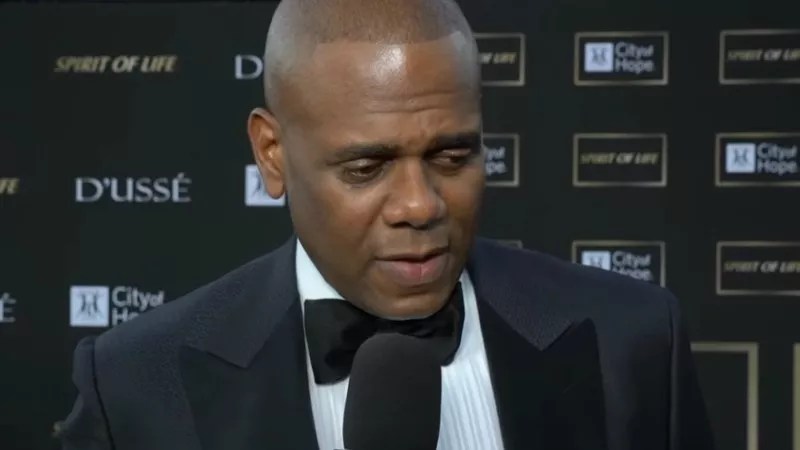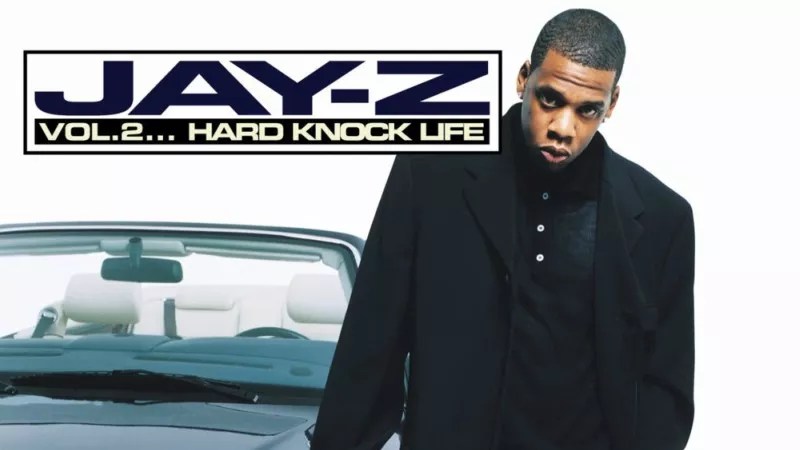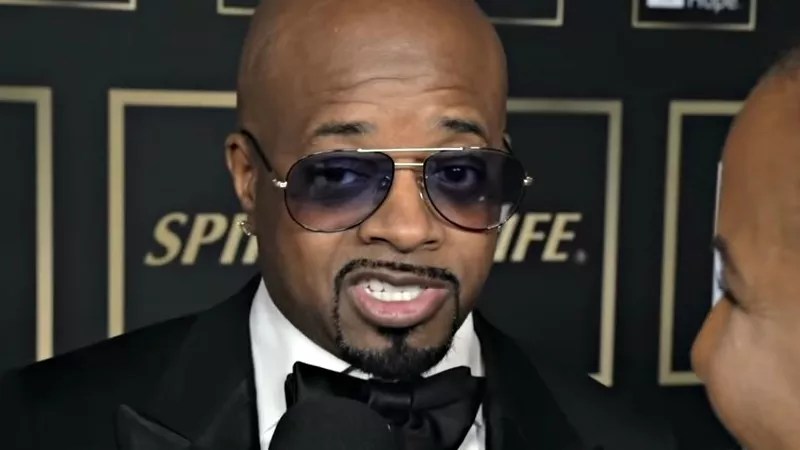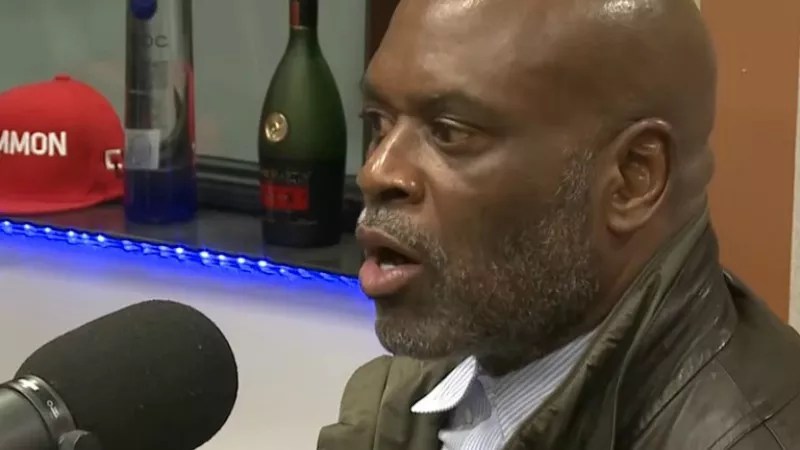

Audio By Carbonatix
On October 11, Jay-Z presented the Spirit of Life Award to Warner/Chappell Music chairman and CEO Big Jon Platt at a gala in Santa Monica, California, in his honor, completing a two-decade circle that leads directly to metro Denver.
How so? Twenty years ago this month, Jay-Z spoke to Westword about Platt, who grew up in Montbello and is now arguably the most successful music executive ever to come of age in the Mile High City.
As we noted in our Platt profile, “Getting Big,” on view below in its entirety, Jay-Z had plenty on his plate when he dialed yours truly, having just scored the first number-one album of what’s turned out to be among the most spectacular careers in popular music. And he wasn’t the only one with nice things to say about Big Jon. We also spoke to producer and songwriter Jermaine Dupri (who was also at the October 11 event), fellow executive L.A. Reid and tunesmith Warren Campbell, then riding high with Dru Hill’s “How Deep Is Your Love.”
Platt chatted with us as well, making it clear how much Colorado contributed to his music-biz rise and ending his remarks with a prediction that’s definitely come true over the intervening twenty years: “I’m not finished.”
Continue reading to find out more about his story, as well as to see a video about Big Jon’s big night.

Jay-Z spoke to Westword about Big Jon Platt the week that Vol. 2…Hard Knock Life hit number one on the Billboard album chart.
“Getting Big“
By Michael Roberts
October 22, 1998
How powerful is Big Jon Platt? Powerful enough to convince rapper and current Rolling Stone cover boy Jay-Z to take time out of the best week of his professional life – a week in which his latest CD, Vol. 2…Hard Knock Life, debuted at the top of the Billboard album charts thanks to out-of-the-box sales of more than 350,000 units – in order to sing the praises of none other than Big Jon Platt. “He knows his business and everything,” Jay-Z says. “But the main thing is, he’s just a good dude, man.”
Platt, who’s six-foot-six and built like a linebacker, is also an urban variation on a Horatio Alger story. Five short years ago, he was a Denver DJ with a reputation that didn’t stretch much beyond the city limits. But now, by virtue of great ears and boundless energy, he’s an A&R consultant for Virgin/Noo Trybe Records and the vice president of the creative wing of EMI Music Publishing. In conjunction with the latter position, he handles the songbooks of some of the fastest-rising stars in the hip-hop and rhythm-and-blues realms. The issue of Billboard that sets down Jay-Z’s accomplishment for posterity also marks the impressive accomplishments of several other Platt clients, including Jermaine Dupri and Tamara Savage (they helped pen Monica’s “The First Night,” a former number-one blockbuster that’s still in the top five on the R&B and pop charts) and Warren Campbell (co-writer of Dru Hill’s “How Deep Is Your Love,” the nation’s hottest R&B single). L.A. Reid, who runs LaFace Records, a company he co-founded with producer/tunesmith Babyface, says that Platt’s current run “isn’t unprecedented. It’s happened a few times before. But it happens very rarely, and only to the superstars of the business world.”
Such praise would satisfy most people, but not Platt, whose triumphs to date haven’t begun to quench his ambition. As one of the few behind-the-scenes sorts who are represented by a public-relations firm, he pushes his own name like he touts those of his charges – and he’s not planning to stop anytime soon. As he puts it, “My aspiration in life isn’t just to be vice president.”
Although he was born in Philadelphia, Platt considers Denver his home town; he grew up in Montbello from the time he was in the fifth grade. He and several siblings were raised there by his mother, who worked security at Rocky Flats to support her family. Her toils kept a roof over her kids’ heads and food in the refrigerator, but there generally wasn’t much cash to spare – so from an early age, Platt set out to earn some of his own. “I’d do odd jobs to keep some money in my pocket or I’d do entrepreneurial things, like buying candy and then taking it to school and selling it,” he recalls with a guffaw. “Then, at the end of the week, I’d go to the record store – and even then I had a sense of the business. Like, I knew that the Sugar Hill Gang was on Sugarhill Records, so if I saw something new on that label, I’d know it was probably rap and I’d buy it. And when I was in high school, I would call information in the city where whatever label was, get the number and try to get them to send me free records. And a lot of times, they would.”
Unfortunately, these freebies came with a hidden cost. “One month I must have run the phone bill up to $500,” Platt says. “It was so thick that I hid the bill from my mom – and then the phone got cut off. I got in so much trouble! My mom was like, ‘As much as you’re spending on the phone bill, you could buy the records.'” Today, he adds, his mother realizes that this investment was a wise one: “I just bought her a house in Atlanta, so in hindsight, I guess she thinks she did the right thing by letting me follow my passion.”
By 1985, Platt had moved from merely collecting vinyl to spinning it at Norman’s Place, a now-defunct club in Aurora. On his first night behind the tables, only six people showed up – but four of them turned out to be basketball stars at Denver high schools such as Manual and George Washington. Platt endeared himself to the young men, who promptly began spreading the word about his fresh hip-hop mix. “They were very influential on their campuses,” he says. “They were people with pull. So when they went to school and told everyone, ‘There’s this guy, Big Jon, who plays the music we want to hear,’ they listened. Each week the crowd got bigger and bigger until it got to a few hundred people, and then it took off. We were getting 700 or 800 people some nights, and it was fun. I was making fifty bucks a night, but I didn’t care. I was there for the music.”

Jermaine Dupri was among the celebrities who honored Big Jon Platt at the City of Hope Spirit of Life gala.
Despite the throngs Platt attracted, the owner of Norman’s Place sold the venue in 1987. Platt appeared there for the next two years under new management, but when he asked the man in charge for a raise commensurate with his well-established popularity, he says, “The guy said no. At that point – and excuse my language – it kind of clicked to me that I was making all this money for this white guy, but I was just a black guy to him. And that turned me off. The fun went away, and so did I.”
He didn’t go far. With a friend, Platt rented a ballroom at a Quality Inn on Colfax and threw a party of his own – and it was a smash. “We rolled the dice, because I had to see if it was really all about me,” he says. “And just like that, I went from making $50 a night to making $900.”
The next year or so proved just as profitable for Platt, but everything came crashing down in 1990, when a young man was murdered at a birthday bash being thrown for Platt. “I wasn’t even there when it happened, but I still took it hard,” he concedes. “That was the lowest point in my life, because a mother lost her child at a party that was given for me. He was a gang member and he was killed by a gang member, but that didn’t make it any easier. I’d always run things with strong security, but this was at a recreation center where they said they couldn’t discriminate against anyone, and they let these people in – and then this incident happened, and the media shredded me to smithereens.”
At age 25, Platt was convinced that his time in the music biz was up. But he changed his mind after a pep talk from a young friend, Tremayne Anchrum. “He told me that I needed to do another party, and I said, ‘I quit.’ And he said, ‘You can’t quit – because if you quit now, you’re letting them take you out on their terms.’ Now, this was an eleventh-grader talking to me, but what he said rang in my head. I hung up the phone and cried and thought, ‘He’s 100 percent right.’ And then I went to my room and started practicing on the turntables again.
“The first party I did after the killing, there were six people there,” he continues. “It was just like starting over again. But I made a promise to myself right then. I said, ‘I’m doing this for one reason, and it’s not the music anymore. I’m doing it for me.’ I said, ‘They took my name away from me, and I need to get my name back to the level where it was before – and when I do, I’m out of town.'”
Over the course of the next three years, Platt dedicated himself to this mission, eventually becoming the biggest draw at another nightspot, Maximilian’s. Afterward, he moved to Los Angeles and hooked up with Anchrum, who by then was on the hoops team at the University of Southern California. Anchrum introduced him to the performers behind Madukey Productions, a fledgling outfit looking for someone to serve as a conduit between it and the hip-hop industry. Platt, who by then had decided to concentrate on the management end of music, took on the challenge, and through sheer persistence landed the crew a remix of the 2Pac single “Keep Ya Head Up.” Before long, he had brokered a publishing deal with EMI for both Madukey and producer Kiyamma Griffin, thereby establishing a relationship between him and Steve Prudhomme, a creative manager at EMI. When Prudhomme jumped to Warner Bros. in 1995, he recommended Platt to take his place. Within six months Platt had scored his first coup by acquiring the publishing rights to “Waterfalls,” a song by TLC that became one of the biggest crossover hits of the mid-’90s. He rose to the firm’s creative-director post the next year and was named vice president the year after that.
The person least surprised by this rapid climb is Platt, who doesn’t want for self-confidence. “There are four types of people in this business,” he says. “You’ve got people who know how to take care of business who don’t know music; you’ve got people who know music but don’t know how to take care of business; you’ve got people who don’t know anything about either one; and you’ve got people who know both. And I’m one of the last types. I know how to take care of business, but music is what I love, and that gives me a huge advantage over someone who majored in business at college. Anyone I sign, I sign because I’m a fan of theirs first. And that makes it easy for me to help them, because I already know what fans want to hear.”

Music executive L.A. Reid is among those who sang Big Jon Platt’s praises to Westword.
That was certainly the case with Jay-Z, whom Platt sought out purely on the basis of his talent. “I heard his first solo album on Priority, Reasonable Doubt, back in ’96, and I thought it was the most incredible album I’d ever heard. So I said, ‘I’ve got to get into business with this guy.’ I met him after that through a friend and approached him about his publishing situation, and his attorney and I worked it out.”
Before long, according to Jay-Z, Platt became part of his inner circle. “I started seeing his work ethic and how he really went after things,” Jay-Z says, “and now he’s one of my people. When I was working on the new record, he was with me the whole way. He called me every day, telling me to watch the business things – because he knew that when I was creating, I was in the zone – and that this record was going to be really special. And he was right. I mean, while you’re having the best success of your career, why let it go to waste? You’ve got to be on top of your business so at the end of the day you not only get shown on MTV and get fame, but you get some fortune, too.”
When it came to Hard Knock Life (issued by the Roc-A-Fella/Def Jam imprint), Platt wasn’t in the position to make creative suggestions. (“I’m a different kind of cat,” Jay-Z says. “Nobody hears what I do until after it’s done, so I didn’t send it to Big Jon until after it was finished. He called me up the next day and said, ‘Oh, my God!'”) But in most cases, Platt doesn’t shy away from offering his opinions. Jermaine Dupri, for instance, is a hip-hop veteran who served as the Svengali for Kriss Kross, the backward-dressing youths who gave the world the rap staple “Jump,” and his connections helped him assemble an impressive supporting cast for his new CD, Life in 1472: Participants include Platt associates Jay-Z, Usher and Krayzie Bones (from Bone Thugs-N-Harmony), plus Mariah Carey, Mace, Nas, Snoop Dogg, Warren G, Slick Rick, Da Brat and Lil’ Kim. But Platt still laid it on the line with Dupri when he thought something wasn’t working. “I would go to Atlanta, and he would play the music for me and we would bounce things off each other,” Platt says. “When I was down there, he told me, ‘You’re one of the people in this business who will always give an honest opinion. And sometimes, you’re almost too honest!'”
Dupri, who records for So So Def/Sony, laughs at this anecdote, but he doesn’t dispute it. “He’s got a great ear for what’s going on, and he loves music,” he says. “That’s where we meet each other. I respect him as much as a friend as I do as a businessperson. We really value each other’s opinions – and he definitely will say if he doesn’t like something. But that’s good. We keep it real with each other, because that’s the best way to be.”
Such counsel is even more pointed when Platt’s directing it at developing artists. Tamara Savage, who has tracks on the next discs by TLC and Shanice as well as Monica’s latest for Arista Records, was a relative novice when she came under Platt’s umbrella, and she credits him with keeping her focused. “He doesn’t completely shoot you down,” she allows. “He’d say to me, ‘Okay, this isn’t working, but there’s a little bit of hope in it. If you listen and do this, we’ve got a shot at it.’ And once he believes in something, he believes in it all the way. He wants you to keep going, never stop, and when you see something good happening, it just pushes you to work harder.”
Campbell, who helped bring “How Deep Is Your Love” to life, tells much the same tale. “Big Jon liked what he heard from me, which wasn’t much,” he says, chuckling. “But he had the ability to kind of hear in its rough form where I was at and to help me take things further, and to grow in the areas where I needed to grow. We’d go over things song by song, and every one I wrote, he’d go, ‘Change that part of the verse’ or ‘You need to make that song shorter, or longer, or faster, or slower’ – technical things that he could hear and that he was almost always right about. And that really helped me be able to critique songs myself. After a while, I’d be able to step back and go, ‘What would Big Jon think about this?’ And then when I’d play it for him, he’d like it the way it was.”
Big Jon’s ability to shape tunes for radio consumption hasn’t gone unnoticed: “Lately, it’s been hit after hit after hit,” says LaFace’s Reid. But the men and women he represents laud him just as much for his fairness when it comes to finances. Dupri puts it bluntly: “I can call up Big Jon and tell him, ‘I need my money, and I need it now,’ and he’ll go in there and fight for it like he’s fighting for me instead of them.”
“A lot of artists used to get screwed over publishing – and a lot of them were R&B artists,” Platt says. “Back in the ’50s, they were getting paid with Cadillacs and stuff like that, and then, when the hits stopped coming, they were left with nothing. So I try to educate the generation that I’m involved with on what it’s about and how to do smart deals. I tell them, ‘This is what your kids can go to school on,’ and I teach them what to look for. Some people only want to think about the music, and that’s fine. But I tell them, ‘If you don’t want to know about this, you’d better have someone around you who does, because if you sign a bad deal, you’re the one who has to honor it. And if you’re only living for the moment, you’re not really someone I want to do business with.’
“I don’t like dealing with people who are content,” he goes on. “You should always want to achieve more, and if you’re content, that’s the most disrespectful thing you can do – to be blessed with a gift and not use it to the fullest.”
[Here’s the aforementioned video about the City of Hope Spirit of Life Gala.]
That’s precisely what Platt tries to do, and as a result, he looks askance at anyone who believes that he should use his muscle to help other Coloradans enter the limelight. He has a Denver songwriter in his stable – Anthony Mance, who contributed a ditty to the latest Brian McKnight album and co-wrote “One Wish,” the title track of the next Deborah Cox disc, with Savage – but he swears that the signing had nothing to do with Mance’s state of birth. “He’s not with me because he’s from Denver,” Platt says. “He’s with me because he had good music. The bottom line is, I’ve seen people lose their jobs by doing favors, and I really feel like I have a responsibility to myself first. I feel that if I do a good job taking advantage of these opportunities, I’ll put Denver on the map. And I didn’t close the door behind me when I opened it. It’s still open, but you’ve got to walk your ass down the path yourself.
“Some people say I haven’t helped people in Colorado enough, but I don’t trip on it, because it comes with the program. Besides, if I give people something, I’m not helping them; I’m hurting them. They’ve got to go through the process so that if something goes wrong, they can troubleshoot and go back and fix the problem so they can keep going.”
At the same time, Platt is one of the few big wheels who listens to unsolicited tapes personally – and actually invites interested parties to send him their efforts…. “I’ve got to reach out to people,” he says. “I’m in the big chair now.”
Reid, for one, believes that Platt’s chair will grow even larger in the not-too-distant future. “Big Jon’s absolutely going to run a label one day,” says the executive, who’s using Platt’s expertise to help him find material for the next Toni Braxton long-player. “It’s definitely a dream of his, and he has the talent to do it. In my opinion, the best person to run a label is a creative person, and Big Jon’s a song man. That’s what it takes. The name of the game is songs and artists, and he has a great understanding of both.”
For his part, Platt won’t come right out and say that he wants to follow Reid into the big-label boardroom – but he does everything but. “I don’t know what I’ll be doing in five years,” he insists. “I could tell you something today, and tomorrow it could be totally different. But I go 110 percent every day and keep my faith in God, and because of that, I know that in five years, whatever I need to do, I’ll be doing. And it’s going to be a fun ride. People who are jealous about where I’m at can talk all they want, but they should save it for a little while. Because I’m not finished.”